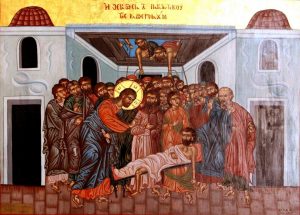 In this Gospel, Jesus forgives the sins of the paralytic man before healing him. It is a manifestation of God’s infinite mercy, but there is today and probably always has been, a rigorism which is uncomfortable of forgiveness without conditions.” It is, of course, quite reasonable to expect that one condition for forgiveness would be repentance and, really, that must be assumed. After all, Jesus’ preaching of the Gospel begins, “Repent (metavoite, “change your minds”), for the kingdom of heaven is at hand. (Matthew 4:17)” (Read on the Sunday after Theophany) We are always free to reject God’s forgiveness. However, it is strange that in the gospel stories of forgiveness, “repentance” is downplayed. When our Lord forgives the woman caught in adultery, he does not ask, “Do you repent for your sin?” but instead interrogates her accusers. Only after they are gone and the woman is spared, does he say, “Go, and sin no more.”
In this Gospel, Jesus forgives the sins of the paralytic man before healing him. It is a manifestation of God’s infinite mercy, but there is today and probably always has been, a rigorism which is uncomfortable of forgiveness without conditions.” It is, of course, quite reasonable to expect that one condition for forgiveness would be repentance and, really, that must be assumed. After all, Jesus’ preaching of the Gospel begins, “Repent (metavoite, “change your minds”), for the kingdom of heaven is at hand. (Matthew 4:17)” (Read on the Sunday after Theophany) We are always free to reject God’s forgiveness. However, it is strange that in the gospel stories of forgiveness, “repentance” is downplayed. When our Lord forgives the woman caught in adultery, he does not ask, “Do you repent for your sin?” but instead interrogates her accusers. Only after they are gone and the woman is spared, does he say, “Go, and sin no more.”
The greatest model of forgiveness is the parable of the Prodigal Son. It is true, as a rigorist might point out, the loving Father does not go out to seek his son, but waits until he repents – that is, returns home. However, the son had prepared a little speech of repentance, “Father, I have sinned against heaven and against you; I no longer deserve to be called your son. (Luke 15:21)” However, the Father completely ignores his little speech, it is of small consequence, and he restores him to the fullness of his inheritance. God’s mercy knows no limits. Also, in this gospel, the Lord does not ask the paralytic, “Have you repented of your sins,” but, without preamble, when he asks for physical healing, God says, “Courage! Your sins are forgiven.” Again, I am not saying that repentance is not necessary, just that it is striking how little the inspired writers make of it, in order to emphasize the infinite mercy of God. Perhaps this uneasiness about repentance comes from a fear that people will misinterpret God’s mercy, or maybe it comes from human hubris that the process of forgiveness depends first on our human will, on our repentance.